Contents
Principles of Insurance
The Principles of Insurance is the basic foundation of any insurance contract. The insurance contract reflects the essence of the Insurance principles. They set the basic rules and framework for the any insurance policy. To understand the Principles of Insurance, we have written the detailed article here.
The User needs to understand the principles of insurance. So that it will help user to understand the concept of insurance. It also helps insurance agents, insurance lawyers to understand it. Insurance has its fundamental principles which make them usable to the insurer/insured person. Without the understanding of basic principles there can be financial losses on both side.
Fist you need to understand the term “Insurance”. By law, you can understand that Insurance is a Contract between Insurer and Insured person. Insurance is for minimizing the risk of any insured person. In any insurance policy, the insurer and insured person comes in the contract. In the simple term, Insurance is legal contract and protect insured person from the unwanted risk.
The Insurance can be classified in two types,
- Life Insurance
- General Insurance
In India, Insurance is regulated by IRDAI (Insurance Regulatory and Development Authority). If you wanted to understand this topics with example then click here.
Principles of Insurance with example help you to understand this topic easily. The Insurance is very important as uncertainty increased in recent times. In my opinion, The one should have Term & Health insurance to tackle uncertainty. The 3rd party insurance is now compulsory for vehicle owner.
The Life insurance policy cover the risk of death of the insured person. The insurer provide compensation if the insured person lost his/her life. The general insurance can be health insurance, marine insurance, vehicle insurance, fire insurance.

Insurance Principles
The Principles of Insurance consist basic 7 principles. The 7 Principles of insurance are listed below,
- Loss Minimization
- Utmost Good Faith
- Indemnity
- Insurable Interest
- Proximate Cause
- Subrogation
- Contribution
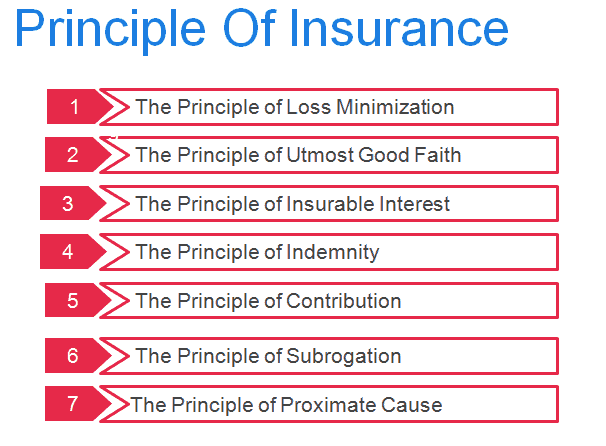
Seven principles of insurance
The Principle of Loss Minimization
The first among principles of insurance is Principle of loss minimization. Generally, People take insurance to minimize their losses against certain events. In some incidents, people can lose their life, health, wealth. In this position the loss happened is far more than he thinks. In this situation, Insurance help to reclaim loss caused by the events.
Insurance cant helps you in every difficult situation but help you in certain events only. These events are written in the insurance contract. For a specific event, people need to choose a different type of insurance.
Like if people care about their health, they should go for health insurance. The principle of loss Minimization states that insurance company tries their best to minimize the risk of the insurance holder. The Insured person also work to try to minimize the loss.
Example: If people have taken car insurance then in a situation when the car is damaged, the insurance company pay a price for repairing. But it doesn’t mean that after insurance, you should feel risk-free. You must try to avoid accident.
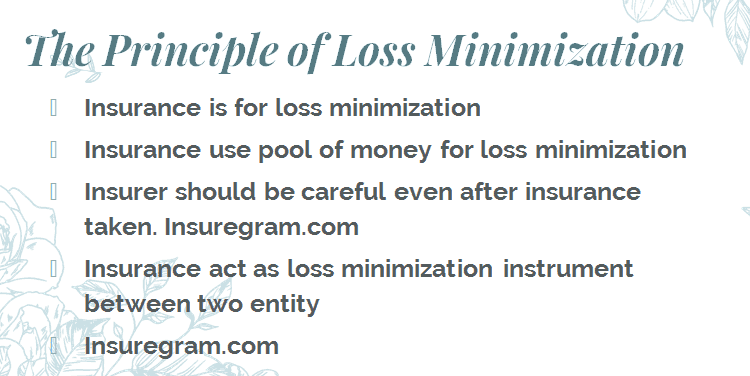
The principle of loss minimization
The Principle of Utmost Good Faith
As we said, insurance is a contract between two or more entities. The contract is a legal document. So every entity in the contract has the utmost good faith in each other. Also, it is needed that each entity discloses every aspect with utmost good faith.
The insurance company provide quotation based on the information provided by the customer. For the smoker the premium may be more than normal person. Also if you doing any hazardous work then the premium amount will increase.
Example: For smokers, the health insurance premium is more. If an insured person hides his smoking habit for a lower premium the insurance can be given. But in a situation of claim of health insurance, an insurance company can not process claim.
Both parties involved in an insurance contract should act in good faith towards each other. The insurer and the insured must provide true information regarding the terms and conditions of the contract. Customer should avoid practice of giving false information to the insurer and it will help in claim insurance fast.
If you are going for health insurance then Insurance companies also ask for the past medical history. The customer need to provide details related to serious injuries and illness.
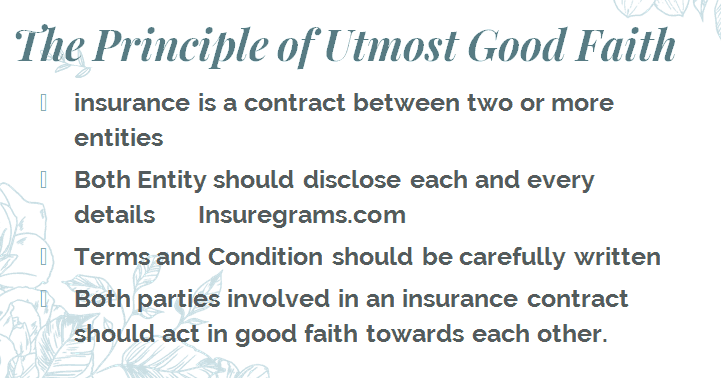
The principle of utmost good faith
The Principle of Insurable Interest
If the financial loss is not justified then the insurance company can’t process the claim. This principle is most usable in Term insurance.
Example: a person needs income documents to claim the term insurance claim. If a person failed to justify the financial loss, an insurance company can deny a claim.
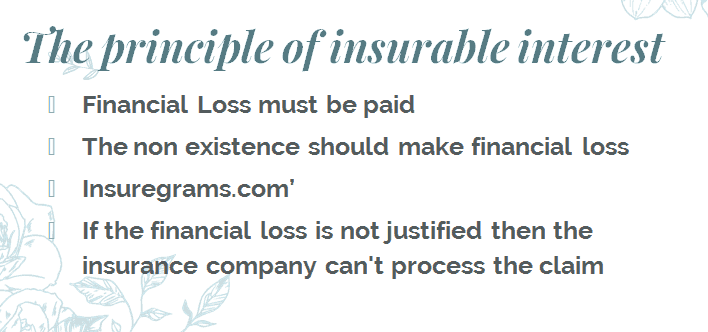
The principle of insurable interest
The Principle of Indemnity
This principle give insured person guaranty that insurance will do best to restore the Financial loss. The insurance cant restore emotional loss caused by the incident. but it tries best to help person in this situation.
That’s why insurance is must in life. Insurance company provides financial compensation.
in General terms, indemnity means security, protection against loss, damage. By this principle only insured person gets compensation against the loss and damage.

The principle of Indemnity
The Principle of Contribution
Insurance company create fund with the help of money got from each policy holder. The pool of money is created and gives benefits to each policyholder. It secures the risk against financial loss.
Also there is certain clause in this principle like,
If person took insurance took insurance of car at half value, company provide only half amount. the rest amount will be paid by insurance policy holder.
The Principle of Subrogation

The principle of subrogation
The Principle of Proximate Cause
In every incident, the damage is happened because of one or more causes. Insurance company find the nearest cause which is responsible for the damage.
Example: in health insurance, if a person got a lung infection, the company finds the nearest cause. it can be a smoking habit or pollution or the working environment.
In some situation, only some causes is included in the contract. in this situation to processing the claim company tries to find nearest cause for damage.
If the proximate cause is one in which the property is insured against, then the insurer must pay compensation. If it is not a cause the property is insured against, then the insurer doesn’t have to pay.
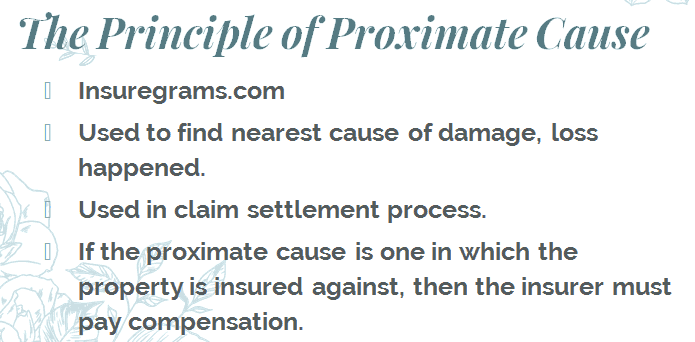
Conclusion
The 7 Principles of Insurance tells us basic things which help us to understand insurance product. The Principles of Insurance includes principles of Loss Minimization, Utmost Good Faith, Indemnity, Insurable Interest, Proximate Cause, Subrogation, Contribution.
If you got job offer in insurance sector then you need to understand “which are 7 Principles of insurance?” and why principles of insurance is important! Hope this article make you to understand the principles of Insurance.
Comments are closed.